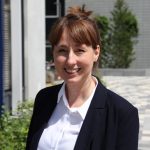Interview with Prof. Dr. Katja Bender and Callistus Agbaam from Bonn-Rhein-Sieg University of Applied Sciences. They explain, how work package 1 examines the Ghanaian political economy structure to understand processes that support or hamper the sustainable energy transition in the health and energy sectors.
Work package 1 aims to examine the political economy of a sustainable energy transition in the Ghanaian health sector. What are the specific aims of your work package?
The specific aim of work package 1 (WP 1) is twofold. First, at the national level, we aim to analyze the political economy structures that hinder or facilitate institutional change towards a sustainable energy transition in the health and energy sectors. By this, we seek to identify key decision makers or coalitions of change agents and the corresponding decision-making processes or their influencing factors, which have led to the emergence of the current institutional status quo.
Second, at the market level, we seek to analyse the factors that have impact on the decision-making behaviour of market actors in terms of the demand (adoption/non-adoption) and supply
(provision/non-provision) of PV solutions in Ghana with respect to current technological advancement and the prevailing institutional framework. Thus, we seek to understand the factors that influence technological change from the perspective of health facility decision makers as well as enterprises and businesses.
In pursuing this line of research, we ultimately aim to contribute to the development of context-specific options and policy recommendations to strengthen governance structures and promote the dissemination of market-based PV energy solutions in the Ghanaian health sector.
How do you address these, what activities have you planned or already started?
To address these goals, we conduct two separate studies. One focuses on the national level (WP 1.1) while the other is centered on the market level (WP 1.2). For both studies, we structure our activities into four main stages. During the first stage, we conduct a comprehensive review of the relevant scientific literature and subsequently develop a conceptual model for the study. During the second stage, we develop data collection tools and conduct in-country data collection exercises – both qualitative and quantitative – in Ghana. Upon completion of the data collection, the third stage consists of analyzing the collected data. During the final stage, the team predominantly focuses on developing working papers based on the results of the data analysis.
Presently, we have completed the activities for stage one and are mid-way through those planned for stage two. Although the data collection tools have been developed, the empirical data collection exercise in Ghana cannot take place at the moment due to the global Covid-19 pandemic. Therefore, it has been duly postponed to a later date.
What are the results so far, and the next steps?
So far, we have achieved several milestones for WP 1. Regarding WP 1.1, a review of both theoretical and empirical literature on the political economy of sustainable energy transitions has been conducted. Moreover, a research paper on “The Political Economy of Sustainable Energy Transition: A State-of-the-Art Review” is currently being developed. In addition, a conceptual model based on an actor-oriented approach embedded in game theory has been developed to enable an analysis of the factors influencing institutional change at the national level from an economics perspective. Furthermore, qualitative data collection tools have been developed and are continuously being reviewed.
For WP 1.2, relevant scientific literature has been reviewed and a first draft of a state-of-the-art research paper on “The Impact of Photovoltaic Technology Diffusion in Developing Countries”, is currently developed. Moreover, a conceptual model for the market level study has been developed, building on theories such as the Theory of Planned Behaviour and the Theory of Reasoned Action. Additionally, the quantitative survey tool (questionnaires) has been developed and the software for data collection duly procured.
Another achievement for the overall EnerSHelF project has been the approval of the project and related fieldwork by the Ghana Health Service Ethical Review Committee (GHS-ERC). This “Ethical Clearance” enables all project partners with activities in Ghana to conduct their fieldwork at health facilities in line with standard practice.
Regarding our next steps, we hope to be able to proceed with the qualitative and quantitative data collection in Ghana as soon as the Covid-19 situation improves, and the travel restrictions have been lifted. Generally, we anticipate that the data collection activities will suffer significant delays due to the current situation. However, we keep our fingers crossed and hope that the situation returns to normal soon.

Katja Bender is a development economist and professor for Economics, in particular Economic and Social Development Bonn-Rhein-Sieg University of Applied Sciences (BRSU). She is co-director of the International Centre for Sustainable Development (IZNE) and head of the international MBA-program ‘Corporate Social Responsibility (CSR) and NGO Management’. In 2017 she has been appointed Vice-President of the European Association for Development Research and Training Institutes (EADI). Her main research interests include the political economy of social protection and health systems development, interactions between institutional change and the diffusion of technologies (focus: photovoltaics; ‘digital health’) as well as understanding preferences for research-practice collaborations. Her working experience includes several Asian and African countries.
Callistus Agbaam is a Research Fellow at the International Centre for Sustainable Development (IZNE), Bonn-Rhein-Sieg University of Applied Sciences, Sankt Augustin. He holds a PhD in International Development at Ruhr University Bochum. He also holds two masters degrees: M.A. in Development Studies from University of the Western Cape, Cape Town, South Africa and M.A. in Development Management from the Institute of Development Research and Development Policy, Ruhr University Bochum, Germany. His research interest includes social protection, poverty and health equity, gender, political economy, sustainability and inclusive development.
